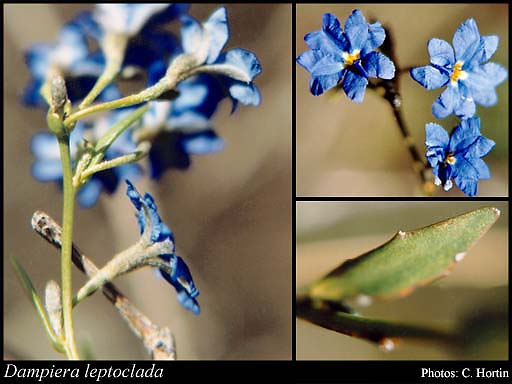- Reference
- Fl.Austral. 4:116 (1868)
- Conservation Code
- Not threatened
- Naturalised Status
- Native to Western Australia
- Name Status
- Current
Erect to semi-prostrate perennial, herb, 0.2-0.6(-1) m high. Fl. blue, Aug to Nov. Sandy, often peaty soils. Swampy areas.

Scientific Description
Stems ribbed. Leaves flat, 15-45 mm long, 2-10 mm wide, Indumentum absent (leaves glabrous); margins entire or toothed. Bracteoles present, 2-3 mm long, glabrous. Pedicel pedicellate, Pedicel length the pedicels 1.5-3 mm long, glabrous, Hair type with simple hairs. Calyx lobes present, Calyx length 0.3-0.7 mm long, glabrous. Corolla blue, 9.5-15 mm long, auriculate, not spurred, hairy on the outside, with dense, simple hairs, glabrous on the inside; central lobes 5.5-10.4 mm long, with wings; outer lobes 6-11 mm long, wing present on both sides and clearly unequal, 1.5-1.8 mm wide on the narrower side, (2-)3 mm wide on the broader side. Anthers connate. Ovary inferior, not gibbose; style 2.7 mm long, glabrous; indusium single, glabrous; ovules one or two. Flowers in August, September, October and November. Occurs in the Jarrah Forest (JF), Warren (WAR) and Esperance Plains (ESP) IBRA Region(s), of the South West (SW) Botanical Province.
Distribution
- IBRA Regions
- Esperance Plains, Jarrah Forest, Swan Coastal Plain, Warren.
- IBRA Subregions
- Fitzgerald, Perth, Recherche, Southern Jarrah Forest, Warren.
- IMCRA Regions
- WA South Coast.
- Local Government Areas (LGAs)
- Albany, Augusta Margaret River, Busselton, Cranbrook, Denmark, Esperance, Gnowangerup, Jerramungup, Manjimup, Nannup, Plantagenet, Ravensthorpe.